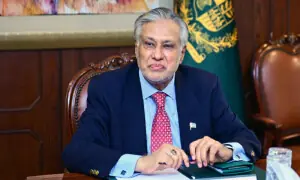Pakistan court says you can’t say you’re trans because you feel it
3 min readKhawaja Sira cannot change their gender, a Federal Shariat Court ruled on Friday while hearing petitions against the Transgender Persons (Protection of Rights) Act, 2018.
“Khawaja Sira cannot be called men or women,” the court said in its reserved decision. Acting Chief Justice Syed Mohammad Anwar and Justice Khadim Hussain pronounced the verdict.
Read: Soul searching in trans bodies
The National Assembly enacted the Transgender Persons (Protection of Right) Act in 2018 with an aim to provide legal recognition to transgender persons and ensure that discrimination against transgender persons in various walks of life shall be punishable.
It also provides them basic rights such as obtaining driver’s licences and passports. It also speaks against the harassment and discrimination of trans people in the workplace, in their homes and in a public setting.
On Friday, the court declared that “gender expression” was not applicable in determining gender, adding that gender was linked to biological sex.
“Islam also provides all fundamental rights to Khawaja Siras, Islam has the concept of Khawaja Siras and orders regarding it,” it said.
Read: Transgender Persons Act 2018: Facts you don’t know
The court ruled that Section 2(n) of the Act (which speaks about the definition of transgender person) was not against Shariat.
“Khawaja Siras are entitled to all basic rights enshrined in the Constitution. Islam also provides all basic rights to Khawaja Siras,” it said.
It added that Khawaja Siras gender would be determined by the predominance of physical effects, adding: a man on whom the influence of man is dominant would be considered a Khwajasira man. A person cannot change gender at will, gender at birth will remain the same, it added.
The court annulled sections 2(f), 2(n)(iii), 3 and 7 of the act.
Section 2(f) defines “gender identity” as a person’s innermost and individual sense of male, female or a blend of both or neither. It adds that gender identity does not necessarily correspond to the sex assigned at birth.
Section 2(n)(iii) comes under the heading of “transgender person”. It says “a Transgender Man, Transgender Woman, Khawaja Sira or any person whose gender identity and/or gender expression differs from the social norms and cultural expectations based on the sex they were assigned at the time of their birth”.
Section 2(n)(iii) defines “transgender person” as transgender man, transgender woman, Khwajasira or any person whose gender identity and/or gender expression differs from the cultural expectations based on their assigned gender at birth.
Section 7 speaks about the right to inherit.
The court ruled that “provisions declared illegal have no legal status”.
The ruling of Federal Shariat Court comes two months after Council of Islamic Ideology’s declaratoin of Transgender (Protection of Rights ) Act 2018 as un-Islamic.
According to Mehleb Shaikh, a transgender rights activist, the rulings of Federal Shariat Court and Council of Islamic Ideology will be used to pressurize the parliament to repeal the 2018 Act.
However, Shariat court’s rulings will not come into affect if an appeal is filed in the Shariat Appellate Bench of Supreme court within 6 months.
“Community activists should strategize how to challenge this in the Supreme Court. This decision is not the end of the world. The battle has just began,” Shaikh added.
Dr. Mehrab Awan commented on the situation saying that this verdict is confusing and ignorant. “It sounds very stupid. It looks directly written out of transphobic playbook that is popular in the west,” she told Aaj News. She added that transgender people were not getting their ID cards made as male or female because the law limited them to get an ‘X’ card.
“On top of that this ruling is saying that intersex people or Khwajasira people are not men or women. Then what are they?” Awan exclaimed.
During 2021 and 2022, various petitions were filed at the Sindh and Lahore High courts to revoke the Transgender Act 2018. However, all those petitions were rejected by the courts.
More to follow…
With reporting by Afzal Javed, our court reporter in Islamabad, and writing by senior desk editor Fahim Hussain in Karachi
For the latest news, follow us on Twitter @Aaj_Urdu. We are also on Facebook, Instagram and YouTube.
























Comments are closed on this story.